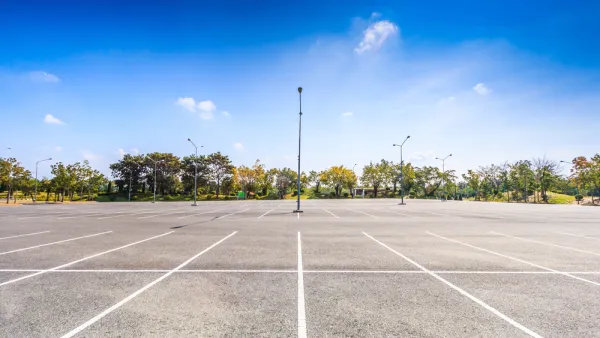Will Oremus investigates an occurrence he noticed recently in Tom Vanderbilt's series on walking – that the cities with the highest "walk scores" were all liberal – and asks why conservative cities don't walk.
Oremus delves deeper in the phenomenon he first took note of in Vanderbilt's recent piece, and finds that the 19 highest scoring cities on Walk Score are all in states that voted for Obama in 2008, and that "the lowest-scoring major cities, by comparison, tilt conservative: Three of the bottom four-Jacksonville, Oklahoma City, and Fort Worth-went for McCain." What, he asks, explains the correlation?
Size doesn't seem to be a determinant, but Oremus thinks that density might very well be. After noting some potential reasons for the correlation, he proposes that, "The same factors that make cities dense and walkable also make them liberal... Besides being older, they also tend to be on the coasts... That leads to both dense development along the coastline and to an atmosphere of diversity and tolerance."
Oremus sees a geographical and historical correlation as well. "Look at the walkability map and you'll see that unwalkable cities are concentrated in the South. While the northern United States developed an industrial economy, the South was dominated by agriculture until the last few decades. Whereas industry breeds density, immigration, and social mobility, agriculture requires vast plots of land and leads to an entrenched social order dominated by the large landowners."
While Oremus's conclusions are far from scientific, they provide a rich vein for debate.
FULL STORY: Why Don't Conservative Cities Walk?

Analysis: Cybertruck Fatality Rate Far Exceeds That of Ford Pinto
The Tesla Cybertruck was recalled seven times last year.

National Parks Layoffs Will Cause Communities to Lose Billions
Thousands of essential park workers were laid off this week, just before the busy spring break season.

Retro-silient?: America’s First “Eco-burb,” The Woodlands Turns 50
A master-planned community north of Houston offers lessons on green infrastructure and resilient design, but falls short of its founder’s lofty affordability and walkability goals.

Test News Post 1
This is a summary

Analysis: Cybertruck Fatality Rate Far Exceeds That of Ford Pinto
The Tesla Cybertruck was recalled seven times last year.

Test News Headline 46
Test for the image on the front page.
Urban Design for Planners 1: Software Tools
This six-course series explores essential urban design concepts using open source software and equips planners with the tools they need to participate fully in the urban design process.
Planning for Universal Design
Learn the tools for implementing Universal Design in planning regulations.
EMC Planning Group, Inc.
Planetizen
Planetizen
Mpact (formerly Rail~Volution)
Great Falls Development Authority, Inc.
HUDs Office of Policy Development and Research
NYU Wagner Graduate School of Public Service




























